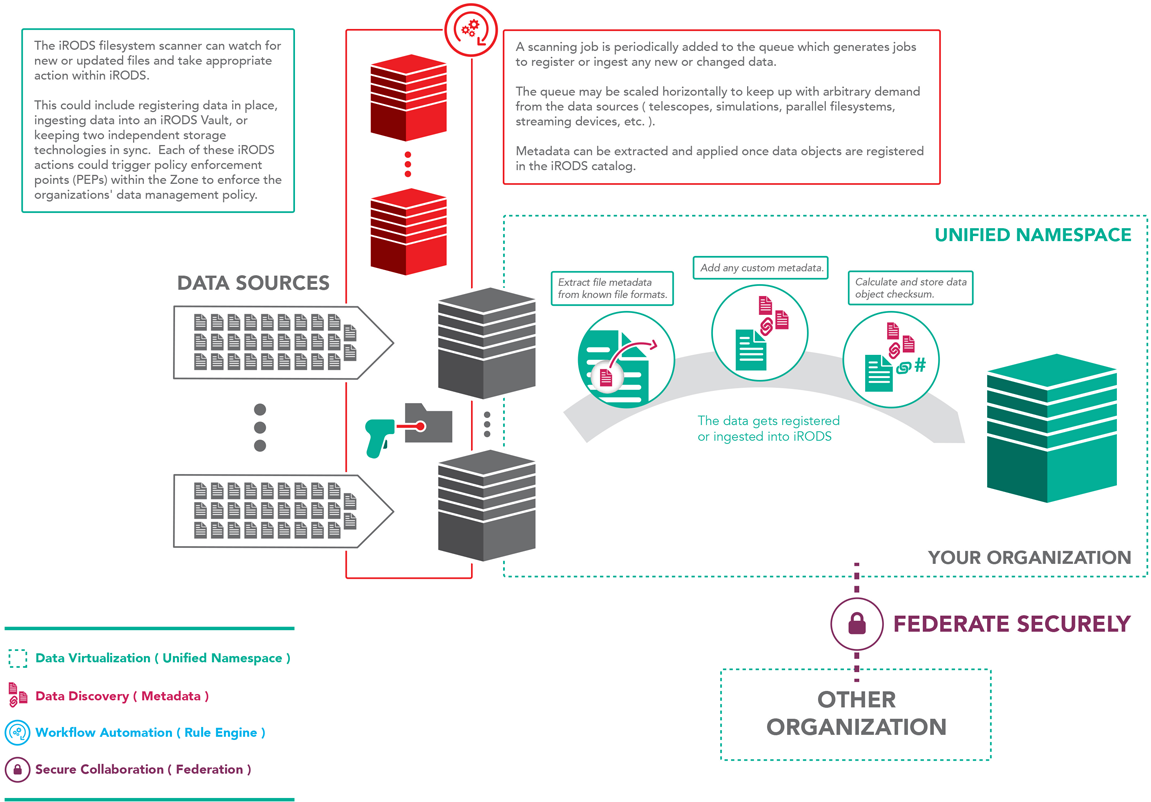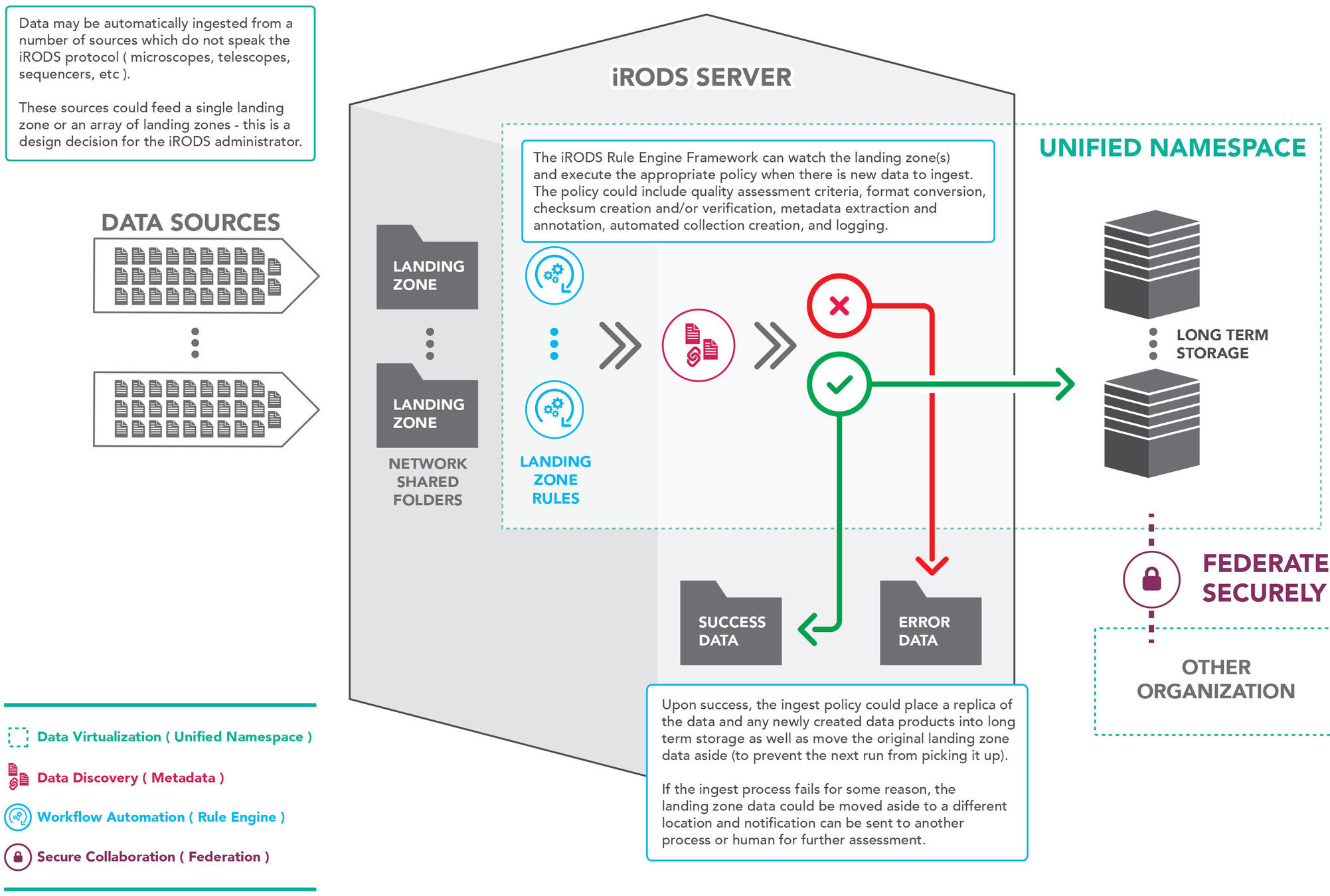Advanced Training:
Automated Ingest



May 28-31, 2024
iRODS User Group Meeting 2024
Amsterdam, Netherlands
Alan King, Senior Software Developer
Martin Flores, Software Developer
iRODS Consortium


iRODS Capabilities
- Packaged and supported solutions
- Require configuration not code
- Derived from the majority of use cases observed in the user community









Automated Ingest
Provide a flexible and highly scalable mechanism for data ingest.
- Directly ingest files to vault
- Capture streaming data
- Register data in place
- Synchronize a file system with the catalog
- Extract and apply metadata

Architecture Overview
- Implemented with Python iRODS Client
- Based on Redis and Celery
- Any number of Celery workers distributed across servers
- File system metadata cached in Redis to detect changes
- iRODS API is invoked only to update the catalog
- Policy defined through event callbacks to user-provided python functions

File system Scanning


File system Scanning
This implementation periodically scans a source directory, registers the data in place, or updates system metadata for changed files.
In this use case, the file system is considered the single point of truth for ingest. Changes are detected during the scan, and the system metadata is updated within the catalog.

Getting Started
sudo apt-get -y install redis-server python3-pip python3-virtualenv
sudo systemctl start redis-server
As the ubuntu user, install and start the Redis server.
python3 -m virtualenv -p python3 rodssync source rodssync/bin/activate pip install irods_capability_automated_ingest
As the irods user, install automated ingest via pip.

Getting Started
export CELERY_BROKER_URL=redis://127.0.0.1:6379/0 export PYTHONPATH=$(pwd)
celery -A irods_capability_automated_ingest.sync_task worker -l error -Q restart,path,file
Open a new terminal, activate rodssync, and set environment variables for the scanner.
As the irods user ...
source rodssync/bin/activate export CELERY_BROKER_URL=redis://127.0.0.1:6379/0 export PYTHONPATH=$(pwd)

Start the Celery workers.
Getting Started
mkdir /tmp/test_dir
for i in $(seq 1 200); do touch /tmp/test_dir/file$i; done
mkdir ./src_dir
cp -r /tmp/test_dir ./src_dir/dir0
Generate some source data and stage it.
Having never scanned this before, we refer to this as the initial ingest.

Default Ingest Behavior
By default, the framework will register the data in place (against the default resource) into the given collection.
imkdir reg_coll
python3 -m irods_capability_automated_ingest.irods_sync start \
./src_dir /tempZone/home/rods/reg_coll \
--synchronous --progress
--synchronous and --progress are not required but give visual indication of progress - scans are asynchronous by default.
Check that our results are registered in place.
$ ils -L reg_coll/dir0/file199
rods 0 demoResc 0 2024-06-12.13:45 & file199
generic /var/lib/irods/src_dir/dir0/file199

Default Ingest Behavior
Stage a different set of data and re-run the ingest.
cp -r /tmp/test_dir ./src_dir/dir1 python3 -m irods_capability_automated_ingest.irods_sync start \ ./src_dir /tempZone/home/rods/reg_coll \ --synchronous --progress
$ ils -L reg_coll/dir1/file199
rods 0 demoResc 0 2024-06-12.13:56 & file199
generic /var/lib/irods/src_dir/dir1/file199Check our results.
Now we will demonstrate that the filesystem cache allows the scanner to only ingest changes - a delta sync.

Customizing the Ingest Behavior
The ingest tool is a callback based system in which the system invokes methods within the custom event handler module provided by the administrator.
These events may then take action such as setting ACLs, providing additional context such as selection of storage resources, or extracting and applying metadata.

Customizing the Ingest Behavior
| Method | Effect | Default |
|---|---|---|
| pre/post_data_obj_create | user-defined python | none |
| pre/post_data_obj_modify | user-defined python | none |
| pre/post_coll_create | user-defined python | none |
| pre/post_coll_modify | user-defined python | none |
| character_map | user-defined python | none |
| as_user | takes action as this iRODS user | authenticated user |
| target_path | set mount path on the irods server which can be different from client mount path | client mount path |
| to_resource | defines target resource request of operation | as provided by client environment |
| operation | defines the mode of operation | Operation.REGISTER_SYNC |
| max_retries | defines max number of retries on failure | 0 |
| timeout | defines seconds until job times out | 3600 |
| delay | defines seconds between retries | 0 |
Available --event_handler methods ...

Customizing the Ingest Behavior
The operation mode is returned during the operation method, which informs the ingest tool as to which behavior is desired for a given ingest job.
To override the default behavior, one of these operations must be selected and returned. These operations are hard-coded into the tool and cover the typical use cases of data ingest.

Customizing the Ingest Behavior
| Operation | New Files | Updated Files |
|---|---|---|
Operation.REGISTER_SYNC (default) |
registers in catalog | updates size in catalog |
| Operation.REGISTER_AS_REPLICA_SYNC | registers first or additional replica |
updates size in catalog |
| Operation.PUT | copies file to target vault, and registers in catalog |
no action |
| Operation.PUT_SYNC | copies file to target vault, and registers in catalog |
copies entire file again, and updates catalog |
| Operation.PUT_APPEND | copies file to target vault, and registers in catalog | copies only appended part of file, and updates catalog |
| Operation.NO_OP | no action | no action |
Available Operations ...

Custom Metadata Annotation
We will implement the operation, to_resource, and post_data_obj_create methods in our event handler.
Using the python iRODS client we will apply filesystem metadata obtained via the Linux stat command.
iadmin mkresc targetResc unixfilesystem $(hostname):/tmp/irods/target_vault imkdir put_coll mkdir -p /tmp/put_dir/dir0 for i in $(seq 1 100); do touch /tmp/put_dir/dir0/file$i; done

Create a new target resource and ingest collection, and stage data again.
Custom Metadata Annotation
# /var/lib/irods/stat_eventhandler.py
from irods_capability_automated_ingest.core import Core
from irods_capability_automated_ingest.utils import Operation
from irods.meta import iRODSMeta
import subprocess
class event_handler(Core):
@staticmethod
def to_resource(session, meta, **options):
return "targetResc"
@staticmethod
def operation(session, meta, **options):
return Operation.PUT
@staticmethod
def post_data_obj_create(hdlr_mod, logger, session, meta, **options):
args = ['stat', '--printf', '%04a,%U,%G,%x,%y', meta['path']]
out, err = subprocess.Popen(args, stdout=subprocess.PIPE, stderr=subprocess.PIPE).communicate()
s = str(out.decode('UTF-8')).split(',')
print(s)
obj = session.data_objects.get(meta['target'])
obj.metadata.add("filesystem::perms", s[0], '')
obj.metadata.add("filesystem::owner", s[1], '')
obj.metadata.add("filesystem::group", s[2], '')
obj.metadata.add("filesystem::atime", s[3], '')
obj.metadata.add("filesystem::mtime", s[4], '')
session.cleanup()Using your favorite editor, edit /var/lib/irods/stat_eventhandler.py.

Custom Metadata Annotation
Should we want this module to register in place, we can simply change the operation returned to REGISTER_SYNC or REGISTER_AS_REPLICA_SYNC.
python3 -m irods_capability_automated_ingest.irods_sync start \
/tmp/put_dir /tempZone/home/rods/put_coll \
--event_handler /var/lib/irods/stat_eventhandler.py \
--synchronous --progressLaunch the ingest job.
$ ils -L put_coll/dir0/file99
rods 0 targetResc 0 2024-06-12.13:59 & file99
generic /tmp/irods/target_vault/home/rods/put_coll/dir0/file99Check our results.

Custom Metadata Annotation
$ imeta ls -d put_coll/dir0/file99
AVUs defined for dataObj /tempZone/home/rods/put_coll/dir0/file99:
attribute: filesystem::atime
value: 2024-06-12 13:59:27.133461630 +0000
units:
----
attribute: filesystem::group
value: irods
units:
----
attribute: filesystem::mtime
value: 2024-06-12 13:57:29.609443478 +0000
units:
----
attribute: filesystem::owner
value: irods
units:
----
attribute: filesystem::perms
value: 0664
units:Inspect our newly annotated metadata.

The Landing Zone


The Landing Zone
In this use case, data is written to disk by an instrument or another source. We can run an ingest job to watch that directory. Once data is ingested, it is moved out of the way in order to improve ingest performance. These ingested files can be removed later as a matter of local administrative policy.
The critical difference between a pure file system scan and a landing zone (LZ) is that the LZ is not considered the single point of truth, it is a staging area for ingest (moving files out of the way).
In a file system scan, the file system is the canonical replica and the catalog and other replicas are kept in sync.

The Landing Zone
Create a new ingest collection.
imkdir lz_collCreate the landing zone and ingested directories.
mkdir /tmp/landing_zone
mkdir /tmp/ingested
Stage data for ingest.
mkdir -p /tmp/landing_zone/dir0 for i in $(seq 1 100); do touch /tmp/landing_zone/dir0/file$i; done
Preparing a Landing Zone ...

The Landing Zone
# /var/lib/irods/lz_eventhandler.py import os from irods_capability_automated_ingest.core import Core from irods_capability_automated_ingest.utils import Operation class event_handler(Core): @staticmethod def operation(session, meta, **options): return Operation.PUT @staticmethod def post_data_obj_create(hdlr_mod, logger, session, meta, **options): path = meta['path'] new_path = path.replace('/tmp/landing_zone', '/tmp/ingested') try: dir_name = os.path.dirname(new_path) os.makedirs(dir_name, exist_ok=True) os.rename(path, new_path) except: logger.info('FAILED to move ['+path+'] to ['+new_path+']')
This will use the default resource (demoResc).

Edit /var/lib/irods/lz_eventhandler.py.
The Landing Zone
python3 -m irods_capability_automated_ingest.irods_sync start \ /tmp/landing_zone /tempZone/home/rods/lz_coll \ --event_handler /var/lib/irods/lz_eventhandler.py \ --synchronous --progress
Launch the ingest job.
ls -l /tmp/ingested/dir0Check the ingested directory for the files.
ls -l /tmp/landing_zone/dir0Ensure the landing zone directory is clean.
ils -L lz_coll/dir0/file99Check the landing zone collection.

Streaming Ingest
For this use case, some instruments periodically append output to a file or set of files.
We will configure an ingest job for a file to which a process will periodically append some data.
#!/bin/bash file=$1 touch $file for i in {1..1000}; do echo "do more science!!!!" >> $file sleep 2 done
Edit /var/lib/irods/append_data.sh (make sure it's executable).

Streaming Ingest
# /var/lib/irods/append_with_resc_name.py from irods_capability_automated_ingest.core import Core from irods_capability_automated_ingest.utils import Operation class event_handler(Core): @staticmethod def to_resource(session, meta, **options): return "demoResc" @staticmethod def operation(session, meta, **options): return Operation.PUT_APPEND

This will use the default resource (demoResc)
Edit /var/lib/irods/append_with_resc_name.py.
Streaming Ingest
Let's cleanup the src_dir before we start.
irm -rf reg_coll
rm -r ./src_dir/*In another terminal, start the data creation process.
bash ./append_data.sh ./src_dir/science.txtCreate a new ingest collection.
imkdir stream_coll
First, remove the data objects that were registered from src_dir and then remove the directory.
Streaming Ingest
Check the results - science.txt is growing in size.
$ ils -l stream_coll/science.txt rods 0 demoResc 374 2024-06-23.10:13 & science.txt $ ils -l stream_coll/science.txt rods 0 demoResc 418 2024-06-23.10:13 & science.txt $ ils -l stream_coll/science.txt rods 0 demoResc 440 2024-06-23.10:13 & science.txt <SNIP>
Start the ingest process with a restart interval of 1s.
python3 -m irods_capability_automated_ingest.irods_sync start \ ./src_dir /tempZone/home/rods/stream_coll \ --event_handler /var/lib/irods/append_with_resc_name.py \ -i 1

Streaming Ingest
Managing a periodic ingest job.
$ python3 -m irods_capability_automated_ingest.irods_sync list
{"singlepass": [], "periodic": ["493676ba-8ee4-11e9-b745-125ca36ad160"]}Halting a periodic ingest job.
python3 -m irods_capability_automated_ingest.irods_sync stop \ 493676ba-8ee4-11e9-b745-125ca36ad160
Stop the celery workers by doing a control-c in the window where they were started.

Scanning S3 buckets
python3 -m irods_capability_automated_ingest.irods_sync start \ /bucket_name/path/to/s3/folder \ /tempZone/home/rods/dest_coll \ --s3_keypair /path/to/keypair_file \ --s3_endpoint_domain s3.amazonaws.com \ --s3_region_name us-east-1 \ --s3_proxy_url myproxy.example.org
Just point the scanner at the bucket.
S3 object semantics notwithstanding, this is exactly the same as a filesystem scan.

THIS IS JUST AN EXAMPLE - DO NOT COPY/PASTE
Questions?

UGM 2024 - Automated Ingest
By iRODS Consortium
UGM 2024 - Automated Ingest
iRODS User Group Meeting 2024 - Advanced Training Module
- 753

